Praise for Brunch: A History
This engaging, informative book traces the history of brunch from its origins as a hunt breakfast for the British elite to the hipster meal par excellence. But the authors scope extends beyond the Anglo-American world to cover brunch in Asia, South Asia, and the Middle East. Her impressive array of sources includes magazines, cookbooks, movies, music, and novels, which make for a delightful account of the meal that has been called one of lifes great pleasures. Colleen Taylor Sen, food writer and historian; coauthor/cowriter, Street Food Around the World: An Encyclopedia of Food and Culture and Food Culture in India and Curry: A Global History
Why we eat what we eat when we eat are questions that are not always tackled together and rarely is the last one the focal point. In her well-researched and innovative history of brunch, Farha Ternikar leads us through a fascinating culinary journey that ripples out globally over the span of more than a century. When probed through a variety of cultural, social, and temporal prisms, the foods and reasons for selecting them become dislodged from our mundane menus to become symbolic markers of an engrossing, wider narrative. George Solt, assistant professor of history, New York University
Brunch turns out to be a great story, intricate and full of surprises. This book takes us out for a rich meal in a fine restaurant and also into the intimate ritual of the family at home. Like the meal itself, Brunch is an eclectic and flexible mix, relating the history of many things today taken for granted. Richard Wilk, Provosts Professor of Anthropology, Indiana University
After the hour-long wait for the perfect eggs Benedict, read Brunch. Ternikars fascinating book shows us how the worlds newest mealtime spread across the globe, from Emily Post at Delmonicos to Dubai. Beyond comfort foods and weekend indulgence lies a powerful history of class, colonialism, family, and home. Daniel Bender, professor and Canada Research Chair in Cultural History, University of Toronto
Brunch
The Meals Series
as part of the Rowman & Littlefield
Studies in Food and Gastronomy
General Editor: Ken Albala, Professor of History, University of the Pacific (kalbala@pacific.edu)
Rowman & Littlefield Executive Editor: Suzanne Staszak-Silva (sstaszak-silva@rowman.com)
The Meals series examines our daily mealsbreakfast, lunch, dinner, teaas well as special meals such as the picnic and barbeque, both as historical construct and global phenomena. We take these meals for granted, but the series volumes provide surprising information that will change the way you think about eating. A single meal in each volume is anatomized, its social and cultural meaning brought into sharp focus, and the customs and manners of various peoples are explained in context. Each volume also looks closely at the foods we commonly include and why.
Breakfast: A History, by Heather Arndt Anderson (2013)
The Picnic: A History, by Walter Levy (2013)
Lunch: A History, by Megan Elias (2014)
Brunch: A History, by Farha Ternikar (2014)
Barbeque: A History, by Tim Miller (2014)
Brunch
A History
Farha Ternikar
ROWMAN & LITTLEFIELD
Lanham Boulder New York London
Published by Rowman & Littlefield
A wholly owned subsidiary of The Rowman & Littlefield Publishing Group, Inc.
4501 Forbes Boulevard, Suite 200, Lanham, Maryland 20706
www.rowman.com
16 Carlisle Street, London W1D 3BT, United Kingdom
Copyright 2014 by Rowman & Littlefield
All rights reserved. No part of this book may be reproduced in any form or by any electronic or mechanical means, including information storage and retrieval systems, without written permission from the publisher, except by a reviewer who may quote passages in a review.
British Library Cataloguing in Publication Information Available
Library of Congress Cataloging-in-Publication Data
Ternikar, Farha, 1970
Brunch : a history / Farha Ternikar.
pages cm(The meals series)
Includes bibliographical references and index.
ISBN 978-1-4422-2942-6 (cloth : alk. paper)ISBN 978-1-4422-2943-3 (electronic : alk. paper) 1. BrunchesHistory. 2. Food habitsHistory. I. Title.
GT2850.T43 2014
394.1'25209dc23
2014003612
 TM The paper used in this publication meets the minimum requirements of American National Standard for Information Sciences Permanence of Paper for Printed Library Materials, ANSI/NISO Z39.48-1992.
TM The paper used in this publication meets the minimum requirements of American National Standard for Information Sciences Permanence of Paper for Printed Library Materials, ANSI/NISO Z39.48-1992.
Printed in the United States of America
To Dad, who taught me his love of aloo paratha and keema, weetabix, and marmalade and biscuits. I wish you were here to share brunch.
Series Foreword
Custom becomes second nature, and this especially true of meals. We expect to eat them at a certain time and place, and we have a set of scripted foods considered appropriate for each. Bacon, eggs, and toast are breakfast; sandwiches are lunch; meat, potatoes, and vegetables are dinner, followed by dessert. Breakfast for dinner is so much fun precisely because it is out of the ordinary and transgressive. But meal patterns were not always this way. In the Middle Ages people ate two meals, the larger in the morning. Today the idea of a heavy meal with meat and wine at 11:00 AM strikes us as strange and decidedly unpleasant. Likewise when abroad, the food that people eat, at what seems to us the wrong time of day, can be shocking. Again, our customs have become so ingrained that we assume they are natural, correct, and biologically sound.
The Meals series will demonstrate exactly the opposite. Not only have meal times changed but the menu as well, both through history and around the globe. Only a simple bowl of soup with a crust of bread for supper? Thats where the name comes from. Our dinner, coming from disner in Old French, disjejeunare in Latin, actually means to break fast and was eaten in the morning. Each meal also has its own unique characteristics that evolve over time. We will see the invention of the picnic and barbecue, the gradual adoption of lunch as a new midday meal, and even certain meals practiced as hallowed institutions in some places but scarcely at all elsewhere, such as teathe meal, not the drink. Often food items suddenly appear in a meal as quintessential, such as cold breakfast cereal, the invention of men like Kellogg and Post. Or they disappear, like oysters for breakfast. Sometimes an entire meal springs from nowhere under unique social conditions, like brunch.
Of course, the decay of the family meal is a topic that deeply concerns us, as people catch a quick bite at their desk or on the go, or eat with their eyes glued to the television set. If eating is one of the greatest pleasures in life, one has to wonder what it says about us when we wolf down a meal in a few minutes flat or when no one talks at the dinner table. Still, meal-time traditions persist for special occasions. They are the time we remind ourselves of who we are and where we come from, when grandmas special lasagna comes to the table for a Sunday dinner, or a Passover Seder is set exactly the same way it has been for thousands of years. We treasure these food rituals precisely because they keep us rooted in a rapidly changing world.
The Meals series examines the meal as both a historical construct and a global phenomenon. Each volume anatomizes a single meal, bringing its social and cultural meaning into sharp focus and explaining the customs and manners of various people in context. Each volume also looks closely at the foods we commonly include and why. In the end I hope you will never take your meal-time customs for granted again.

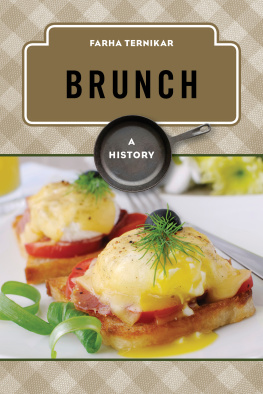



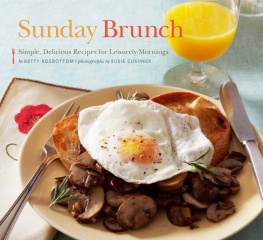

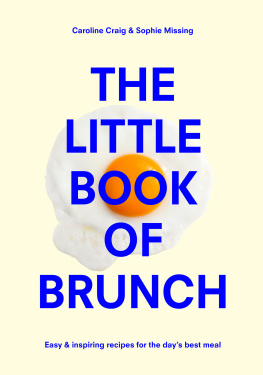

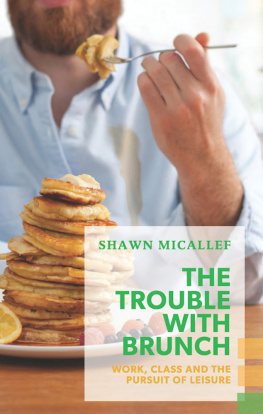
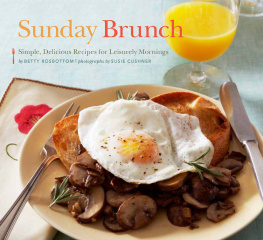
 TM The paper used in this publication meets the minimum requirements of American National Standard for Information Sciences Permanence of Paper for Printed Library Materials, ANSI/NISO Z39.48-1992.
TM The paper used in this publication meets the minimum requirements of American National Standard for Information Sciences Permanence of Paper for Printed Library Materials, ANSI/NISO Z39.48-1992.